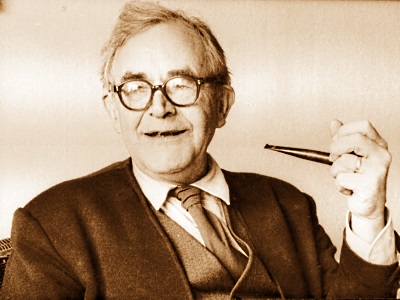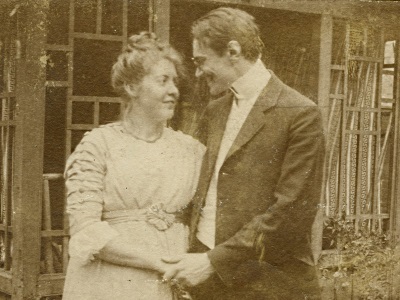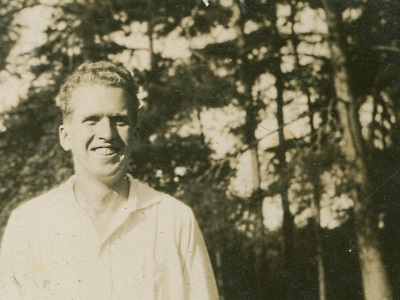…You know, Ebbo, you entered into close contact with people who either had not experienced rebirth in the biblical sense or were at least very unclear. … And simultaneously you turned away from the majority of God’s children! Our recent talks made it evident to me that you do not see that clearly. For you are now surprised that the people of the fellowship movement, or quite a few of them, no longer accept you. Ebbo, you know that you turned strongly against them. Have you forgotten? And you did indeed go in ways different from theirs. Don’t be upset with me for telling you this. … Perhaps you no longer remember yourself how strongly and unilaterally you emphasized the Sermon on the Mount, and how sharply you criticized those that would put forgiveness of sins too much into the foreground in your opinion….
Oh, Ebbo, what I wish for you is that you are where God wants to have you and where you are best able to work effectively. Dear Ebbo, how terrible if you would only recognize it in eternity! And your strength would not have been at the disposal of God’s kingdom the way it ought to have been!
Arnold answered his sister in a letter which he then published in Die Wegwarte, the community’s periodical, in March 1925. Although he had left the evangelical movement he had never denied his faith in Jesus.
Your letter is a great joy to me, a deep‑felt joy, for I see from it that as far as humanly possible you are doing what God wants of you and what God has led you to. I support you in your work wholeheartedly; this I can do from the depths of my soul, for my long years of evangelizing and caring for the Fellowship have always been an essential part of my life, the life given me by God.
It is a misunderstanding, a totally false report, if you have been told that I ever spoke about the Fellowship Movement or its Christianity in such a way as to reject it. This has never been the case and never can be. I have never separated myself from the brothers and never will.
However, I can understand how this erroneous opinion has come about in regard to the way I know that I was led. I never felt that the forgiveness of sins was placed too strongly in the foreground. On the contrary, I am convinced that it is impossible to emphasize the forgiveness of sins too strongly. Life itself, God himself with his whole heart, is found in the forgiveness of guilt, in redemption from evil in the past as well as liberation from evil in the present.
What I do oppose energetically is something altogether different: when in spite of the experience of forgiveness people look away from this great heart of God and remain bogged down in their own small heart; that people get completely lost in their personal experience, their little, personal, self‑centered life – precisely in the religious sphere. They place a new self‑centered life, an egotistical striving for personal purity, goodness, and happiness at the heart of their piety; even work they do for others is done with an eye to their own happiness. I am certain that it is because of the biblical prophets including John the Baptist and – far more than all prophets – Jesus himself and his Holy Spirit that I am able to contradict this error.
The Fellowship Movement is declared “old and tired” by faithful members … who say that “new witnesses and new strength must be given to revive it.” The cause of this tiredness is just this false subjectivity of a self‑centered life, in which people devote themselves to their own little personal ego or that of their neighbor.
Basically this has always been recognized in the Fellowship Movement. Efforts were made to overcome it through an understanding of the Bible and engrossing oneself in the biblical prophecies of God’s kingdom. This is the way for all of us to become freer of the self‑centeredness of narrow Christian fellowship; but as long as this understanding of the Bible remains only an intellectual understanding, it has no power. As theory or dogma alone it is meaningless. Only when its living strength takes hold of our lives and transforms them to accord with God’s kingdom does this understanding of the Bible become power and testimony.
Do study the prophets some time and, in this connection, Jesus’ Sermon on the Mount. Just as it is impossible to over-emphasize forgiveness of sins, it is impossible to over-emphasize God’s kingdom and the Sermon on the Mount. In the all-encompassing words of the Sermon on the Mount, the character of God’s rule and the character of the citizens of his kingdom is described very plainly – so plainly that we Christians of today are shown up as disobedient and faithless because we evade the illuminating light of God’s future.
The true destiny of Christ’s church, however, is to fulfill God’s future. Forgiveness means the kingdom. God and his kingdom must become great in our lives so that we ourselves, and our private religious life, become small. To confess the greatness of God in his justness and holiness, in his all‑inclusive love and mercy, the greatness of God as Creator and Redeemer of the world, that is the task of the church of God.
We tend to forget that the context in which personal rebirth is placed here is the supra-personal context of God’s kingdom in the third chapter of John. The coming kingdom is the determining element in the Bible. We must be completely overwhelmed and filled by this future kingdom. The Holy Spirit wants to lead us into the future. He is to bring Jesus’ words to life for the world of the future; he is to lead us so that we become a living example, a parable, a visible testimony of the coming kingdom.
You are right in saying that under the strong impression of this kingdom of God and his future I have come into close contact with many persons who have not yet been reborn in the biblical sense or were still very unclear in regard to this personal renewal. But I never wanted to be associated more with those who were still outside God’s kingdom than with those who have been reborn and serve God’s kingdom. All the same, I do question a rebirth that has no connection with God’s coming kingdom; and I believe that God awakens many who open themselves to his coming kingdom but are still unclear about their personal forgiveness and salvation. The evangelizing task of devoting ourselves to people who truly hunger and are awakened by God must show us the way to acknowledge hunger for justice, thirst for God’s love, and expectation of God’s coming, which is in the same place as these people. We need to be given the strength from the Holy Spirit to testify to the new birth to those who are awakening – just like Jesus spoke to Nicodemus, a man who was gripped by the kingdom – as those in today’s Youth Movement and the Religious Socialists. But it is just as important that we give Christians – beginning with their personal lives – clear and definite witness of their great responsibility in respect to social justice in God’s kingdom, in respect to Jesus Christ’s coming kingdom of peace, and therefore in respect to the demands and promises of his Sermon on the Mount, just as Jesus did particularly to the group of his closest disciples…
Published as “An eine Gemeinschafts-Christin” (To a Fellowship Christian) in Die Wegwarte nos. 10–11 (October–November, 1925): 101–3.
Article edited for length and clarity.


